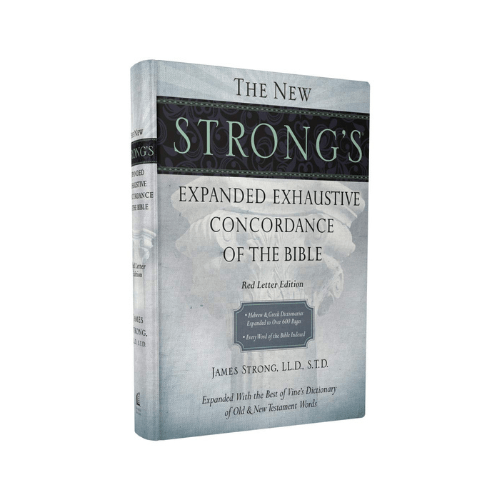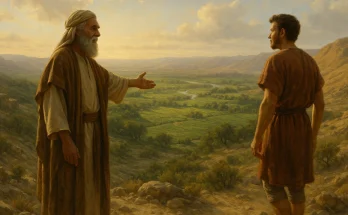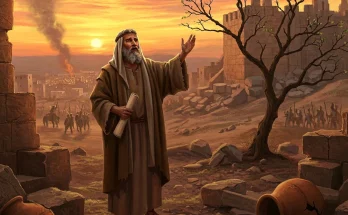Have you ever faced a moment when God asked you to let go of something you deeply loved? That’s the heart of Genesis chapter 22—a chapter that challenges us to trust even when the path is unclear.
In this powerful story, we walk with Abraham up Mount Moriah, watching him carry wood for a sacrifice he hopes won’t be his son. God’s request feels impossible, yet Abraham obeys. Why? Because he believes God will provide. And He does—a ram caught in the thicket becomes the substitute. This moment isn’t just about obedience; it’s about revelation. Through it, we see a picture of sacrificial love, provision in the wilderness, and a promise that stretches far beyond one man’s faith.
But this chapter also raises deep questions. What does it mean to trust God fully? How do we respond when His will doesn’t make sense? And where do we find the strength to surrender?
📖 Explore the Old Testament from start to finish with this easy-to-follow study guide! 🔍 Grow in faith and understanding—get your copy today!✨
Genesis chapter 22 doesn’t just recount a test—it reveals the character of God. He is not only just; He is faithful, intentional, and always working toward His promises.
As we explore this outline, we’ll reflect on Abraham’s journey, Isaac’s role, and the foreshadowing of a greater Lamb yet to come. Each verse invites us to see our own faith tested and shaped by a God who provides.
God Tests Abraham’s Faith (Genesis 22:1–2)
1 After these things God tested Abraham and said to him, “Abraham!” And he said, “Here am I.” 2 He said, “Take your son, your only son Isaac, whom you love, and go to the land of Moriah, and offer him there as a burnt offering on one of the mountains of which I shall tell you.”
This chapter opens with a divine test, not a temptation. God tells Abraham to take his son Isaac—his only son, whom he loves—and offer him as a burnt offering on a mountain He would reveal. This is not a test of cruelty, but of covenant trust. God highlights Isaac’s value to Abraham, making the weight of the request clear. For beginners, it’s important to understand that God already knew Abraham’s heart; this test was meant to reveal it and strengthen his obedience.
Abraham Obeys Without Delay (Genesis 22:3–5)
3 So Abraham rose early in the morning, saddled his donkey, and took two of his young men with him, and his son Isaac. And he cut the wood for the burnt offering and arose and went to the place of which God had told him. 4 On the third day Abraham lifted up his eyes and saw the place from afar. 5 Then Abraham said to his young men, “Stay here with the donkey; I and the boy will go over there and worship and come again to you.”
Abraham rises early the next morning to obey. He doesn’t delay, argue, or complain. He takes two servants, Isaac, and wood for the offering, then journeys to the place God showed him. When they arrive, he tells his servants, “We will worship and we will come back to you.” These words reveal a quiet confidence in God’s ability to provide or even resurrect. Abraham’s obedience is immediate, and his faith is already visible through his words.
Isaac Carries the Wood (Genesis 22:6–8)
6 And Abraham took the wood of the burnt offering and laid it on Isaac his son. And he took in his hand the fire and the knife. So they went both of them together. 7 And Isaac said to his father Abraham, “My father!” And he said, “Here am I, my son.” He said, “Behold, the fire and the wood, but where is the lamb for a burnt offering?” 8 Abraham said, “God will provide for himself the lamb for a burnt offering, my son.” So they went both of them together.
As they ascend the mountain together, Abraham places the wood for the sacrifice on Isaac’s back. Isaac notices something is missing and asks, “Where is the lamb for a burnt offering?” Abraham replies, “God will provide for himself the lamb.” This moment offers a beautiful foreshadowing of Christ, who would one day carry the wood of His cross. Abraham’s answer isn’t just a hopeful guess—it’s a declaration of trust in God’s provision.
Abraham Builds the Altar (Genesis 22:9–10)
9 When they came to the place of which God had told him, Abraham built the altar there and laid the wood in order and bound Isaac his son and laid him on the altar, on top of the wood. 10 Then Abraham reached out his hand and took the knife to slaughter his son.
When they reach the place, Abraham builds an altar, arranges the wood, and binds Isaac. He lays his son on the altar and reaches for the knife to carry out the sacrifice. There’s no record of struggle, only silent obedience. Isaac, likely a strong young man by this point, willingly submits. This act of surrender from both father and son points forward to the greater Father and Son who would one day walk a similar path. Abraham’s trust is complete—he’s willing to give up the promise to obey the Promise-Giver.
God Stops the Sacrifice (Genesis 22:11–12)
11 But the angel of the LORD called to him from heaven and said, “Abraham, Abraham!” And he said, “Here am I.” 12 He said, “Do not lay your hand on the boy or do anything to him, for now I know that you fear God, seeing you have not withheld your son, your only son, from me.”
Just as Abraham lifts the knife, the angel of the Lord calls out from heaven, “Do not lay your hand on the boy.” God declares that He now knows Abraham fears Him—that is, he reveres, trusts, and honors God above all. Abraham has passed the test. It’s crucial to see here that God never intended for Isaac to die. The point was never sacrifice, but surrender.
The Ram in the Thicket (Genesis 22:13–14)
13 And Abraham lifted up his eyes and looked, and behold, behind him was a ram, caught in a thicket by his horns. And Abraham went and took the ram and offered it up as a burnt offering instead of his son. 14 So Abraham called the name of that place, “The LORD will provide”; as it is said to this day, “On the mount of the LORD it shall be provided.”
Looking up, Abraham sees a ram caught in the thicket by its horns. He takes the ram and offers it in place of Isaac. In response, he names the place Yahweh-Yireh, meaning “The Lord will provide.” This moment is rich with meaning. God doesn’t just test—He also provides. The ram becomes a substitute, a picture that echoes forward to the Lamb of God, Jesus Christ, who would be offered in our place. God not only stops the knife, but supplies the sacrifice.
God Reaffirms His Promise (Genesis 22:15–18)
15 And the angel of the LORD called to Abraham a second time from heaven 16 and said, “By myself I have sworn, declares the LORD, because you have done this and have not withheld your son, your only son, 17 I will surely bless you, and I will surely multiply your offspring as the stars of heaven and as the sand that is on the seashore. And your offspring shall possess the gate of his enemies, 18 and in your offspring shall all the nations of the earth be blessed, because you have obeyed my voice.”
Once more, the angel of the Lord speaks from heaven. Because Abraham did not withhold his son, God reaffirms His covenant: Abraham’s offspring will be as numerous as the stars and sand. And through his seed—all nations of the earth will be blessed. This reaffirmation shows that obedience brings deeper revelation and blessing. Abraham’s willingness to surrender the promise leads to the confirmation of God’s unstoppable plan.
The New Strong’s Expanded Concordance
The best concordance for word study! This exclusive new edition of a legendary classic puts generations of biblical research at your fingertips.
Abraham Returns (Genesis 22:19)
19 So Abraham returned to his young men, and they arose and went together to Beersheba. And Abraham lived at Beersheba.
Abraham returns to his servants and heads back to Beersheba. Interestingly, Isaac is not mentioned here, though he clearly continues on. Many scholars see this as symbolic—Isaac’s near-death experience and reappearance later can be seen as a type of resurrection. God not only tests and provides, but restores.
The Family Line of Rebekah (Genesis 22:20–24)
20 Now after these things it was told to Abraham, “Behold, Milcah also has borne children to your brother Nahor: 21 Uz his firstborn, Buz his brother, Kemuel the father of Aram, 22 Chesed, Hazo, Pildash, Jidlaph, and Bethuel.” 23 (Bethuel fathered Rebekah.) These eight Milcah bore to Nahor, Abraham’s brother. 24 Moreover, his concubine, whose name was Reumah, bore Tebah, Gaham, Tahash, and Maacah.
The chapter ends with news from Abraham’s extended family. We learn of Nahor’s descendants, including Rebekah, who will one day marry Isaac. This genealogy reminds us that God is not done. Even after the test, the promise moves forward through generations. God’s plan is always unfolding—even in the details.
Genesis chapter 22 teaches us that faith is refined through testing, not ruined by it. God never asks for blind obedience without purpose. He wants us to know that He can be trusted even when we don’t understand. Obedience opens the door to deeper blessing, and every act of surrender reveals a God who sees, who cares, and who always provides.
Final Thoughts on Genesis Chapter 22
Genesis chapter 22 reminds us that faith is not just belief—it’s surrender. God tested Abraham to reveal a heart that trusted Him completely. In the moment of deepest sacrifice, God provided the ram. He showed that He is both just and merciful.
This chapter points us to Jesus—the Lamb God provided for our salvation. It calls us to trust God, even when the path feels unclear. If we obey, He will provide, restore, and lead us forward. Take time to meditate on genesis chapter 22 this week. Let its truth speak to areas where trust feels hard. God’s Word brings clarity, peace, and direction when we need it most. Don’t stop here. Keep exploring the story of Scripture. Visit our Chapter Outlines page and continue your Bible study. Let God’s voice guide you, one chapter at a time.
Now is the time to draw near, to listen, and to walk in faith. Trust God’s Word to bring restoration and wisdom into every part of your life.
Frequently Asked Questions About Genesis Chapter 22
1. Why did God test Abraham in Genesis chapter 22? God tested Abraham to reveal the depth of his faith and obedience. The test was not meant to harm but to refine. It showed that Abraham trusted God more than the promise itself.
2. Was God really going to let Abraham sacrifice Isaac? No. God never intended for Isaac to die. The command was a test of faith, and God intervened before Abraham could act. He provided a ram instead.
3. What does the ram symbolize in Genesis chapter 22? The ram symbolizes God’s provision and serves as a foreshadowing of Jesus Christ, the Lamb of God, who would die in our place.
4. Why is Genesis chapter 22 important for Christians today? It teaches us to trust God in moments of testing. It also points to the gospel, showing how God provides a substitute to fulfill His promises.
5. How can I apply Genesis chapter 22 to my life? We apply it by learning to surrender what we hold most dear to God. Trusting His Word, even in uncertainty, brings deeper peace and blessing.




